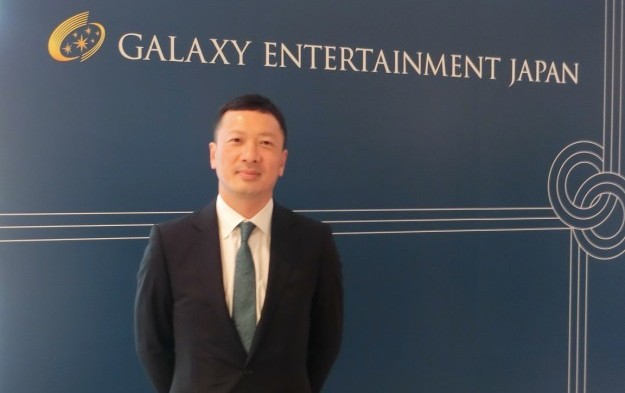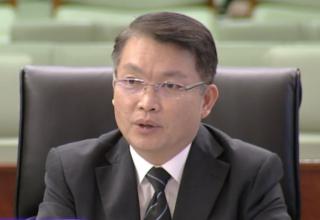Galaxy Osaka investment similar to Cotai flagship: Ted Chan
May 23, 2019 Newsdesk Japan, Latest News, Top of the deck

Japan integrated resort (IR) projects are likely to be a success in whichever cities they are located, said Ted Chan Ying Tat (pictured), chief operating officer of Galaxy Entertainment Japan, in an interview with GGRAsia.
The firm is a unit of Macau casino operator Galaxy Entertainment Group Ltd, and has been set up to further the group’s effort – probably in partnership with the state-owned casino operator in the European principality of Monaco – for a Japan casino licence.
Mr Chan spoke to us on the sidelines of the recent Japan Gaming Congress in Tokyo. He confirmed that Galaxy Entertainment was taking part in Osaka’s request for concept (RFC) process, and that were the group to build in Osaka, the scale of investment would be similar to that for its Macau flagship, Galaxy Macau, on Cotai.
The latter is a multi-phase project that first opened in 2011 at an initial cost of HKD16.5 billion (US$2.1 billion) according to the group’s website. Phase two launched in 2015 bringing the investment in Galaxy Macau up to that point to HKD43 billion, out of an eventual expected investment of HKD100 billion, according to the portal. In August last year, Francis Lui Yiu Tung, vice-chairman of Galaxy Entertainment, said the spend on Galaxy Macau phases three and four would be “no less than HKD45 billion”.
Osaka’s RFC process opened on April 25 and ends on Friday (May 24). It has been held even though Japan’s national government has yet to announce its own “basic policy” on IRs, including criteria for approving where they can be located, and has now delayed any such statement from summer time to the autumn or later, according to Japanese media. The term IR is used in Japan to describe large-scale gambling resorts with ancillary facilities.
Mr Chan acknowledged to GGRAsia the huge commercial potential of Osaka thanks to its appeal to domestic visitors and ones from Greater China. The Osaka authorities have stipulated their hoped-for resort should have a land area of 49 hectares (121 acres). That is the same land area available on Yumeshima island, a land reclamation area in Osaka Bay, and which is the the locally-favoured site for an IR.
Cotai to Yumeshima
Mr Chan told us: “If you look at the size of the land [on Yumeshima island] – 49 hectares – it is similar to Galaxy Macau [in Cotai]. We have 47 hectares altogether [in Cotai] and currently at phase one and phase two, we only built 50 percent [of the whole land bank]: it cost us about US$5 billion and we’re chipping in another US$6 billion for phase three and phase four,” Mr Chan remarked to GGRAsia.
“It looks like that could be the right [investment] amount” for Osaka, Mr Chan told us. Japanese media outlets have reported that the Osaka authorities’ plan requires a JPY930-billion (US$8.5 billion) investment in a casino resort.
Mr Chan used the term “actively participate” in relation to Galaxy Entertainment’s involvement in Osaka’s RFC process.
Under the Osaka RFC requirements, a submission should include a number of core attributes as identified by the national government in ordinances on March 26. They are: convention capacity; exhibition space; an attraction to promote to the world Japan and its culture; ability to function as a tourism gateway to other parts of the country; and a large-scale hotel.
Mr Chan said Galaxy Entertainment had been attracted to Osaka because of the current high hotel occupancy in Osaka city; the metropolis’ and prefecture’s good transport links to other popular tourism destinations in the Kansai region; and Osaka’s appeal to domestic and international travellers. Galaxy Entertainment’s track record of serving in Macau customers from what he termed Greater China could be an advantage for the group in bidding for Osaka, he added.
“With our experience in Macau, I think we can claim we know Greater China markets,” stated Mr Chan. He added: “You’ll be surprised the domestic [Japan] market is quite big here. You need to address this as well. So we have to create something that they like.”
Mr Chan, along with other representatives from Galaxy Entertainment Japan, had highlighted during a session at the Japan Gaming Congress that the group would be likely to target “premium” clientele for a Japanese IR.
Keen to learn
Mr Chan did not give a direct reply when asked by GGRAsia if Galaxy Entertainment was committing most of its resources – regarding a Japan bid – to Osaka. But he remarked to us: “We have done a lot of homework. I think so have the other operators. I truly believe that in whichever cities, IRs will be very successful.”
The executive confirmed that Galaxy Entertainment had, during last year, participated in request-for-information processes launched by the local authorities in metropolitan and regional locations including Yokohama, Nagasaki, Tomakomai in Hokkaido, Wakayama, and Aichi.
“We like Japan. We like all areas…but it is a matter of what the local government and the local people really want, and we would like to understand what they want,” Mr Chan said.
“Currently, there are a lot of obstacles that we have to go through, such as the size of the MICE facilities. It seems that it [the central government’s criteria on facilities] applies to all – but then when we go to some regional cities, it may not fit. We need to clarify how do we achieve this. We do not want to build something that might not work,” he added.
The Galaxy Entertainment Japan executive also highlighted other concerns that the group wished to clarify with the local government, for better and clearer planning for an IR project in the country.
Regarding the stipulation that 3 percent of gross floor area of a Japan IR could be for casino use, there were still important clarifications required, said Mr Chan. “What is meant by 3 percent? Does that include the passages? Does that include the back of house? Or like in Singapore, do you only include the gaming positions?” Depending on the answers to such questions, it could make things “significantly different in terms of the planning,” suggested Mr Chan.
Details important
“What we really need to clarify – together with the financiers and the government – is the land use… The land use, after the first 10 years [following certification of an IR area], has to be renewed every five years. According to the Integrated Resort Implementation Law, it says the local assembly and the local city [government] have to approve it. It is not a matter of your operations – whether you observe all rules and regulations – it is in the hands of the local assembly… we need more clarity on what is the criteria for the renewal approval”, Mr Chan said.
Galaxy Entertainment and its European partner Société des Bains de Mer et du Cercle des Étrangers à Monaco (SBM) are in a joint push for a casino licence in Japan. But Galaxy Entertainment currently does not have a plan to increase its existing 5-percent stake in the Monaco casino firm, Mr Chan noted to us.
“Not every company can invest in SBM. It is owned by the principality of Monaco, by the government. They invited us… so it is all about the prestige. We’re very honoured to be part of the family in SBM in Monaco,” Mr Chan told us.
With the partnership with SBM on the Japan bid, the Galaxy Entertainment executive said it is “more about working closely together to deliver a project in Japan”.
“SBM was the first IR in the world,” suggested Mr Chan, referring to that firm’s first casino and entertainment facilities. “It was set up 150 years ago. So with this history, we hope that we can bring European flavour on top of what Galaxy has been doing – we’re quite proud to believe that we’re one of the best in Asia,” Mr Chan remarked to us.
“So think about the best of Europe, the best of Asia and best of Japan. I think that’s our belief and our vision, for the project [in Japan],” he added.
Related articles
-
 Further Japan IR phase to play for amid...
Further Japan IR phase to play for amid...Oct 31, 2024
-
 City transfers control of land...
City transfers control of land...Oct 03, 2024
More news
-
 GKL provides its new table game...
GKL provides its new table game...Nov 22, 2024
-
 The Baron Upright, a new cabinet from...
The Baron Upright, a new cabinet from...Nov 22, 2024
Latest News
Nov 22, 2024
Casino operator Grand Korea Leisure Co Ltd (GKL) says it has achieved its first commercialisation of a new-to-market table game, developed via an in-house competition dating to 2021. Grand Korea...Sign up to our FREE Newsletter
 (Click here for more)
(Click here for more)
Pick of the Day
”As we navigate the final steps of the licensing process, we remain confident in our ability to align with Brazil’s regulatory requirements”
Eusebio Tanco
Chairman of DigiPlus Interactive
Most Popular
 Macau to get 36mln visitors in 2025: Secretary Lei November 21, 2024
Macau to get 36mln visitors in 2025: Secretary Lei November 21, 2024  Gaming technology firm IGT reports hacking incident November 21, 2024
Gaming technology firm IGT reports hacking incident November 21, 2024  US$30bln 2025 GGR target achievable for Macau: CE November 19, 2024
US$30bln 2025 GGR target achievable for Macau: CE November 19, 2024  Marina Bay Sands projects 40pct EBITDA leap post extension November 20, 2024
Marina Bay Sands projects 40pct EBITDA leap post extension November 20, 2024  Macau big-event outdoor venue gets trial run Dec 28: CE November 20, 2024
Macau big-event outdoor venue gets trial run Dec 28: CE November 20, 2024









